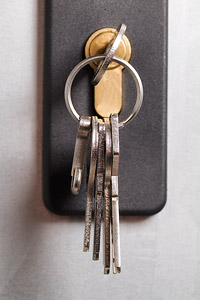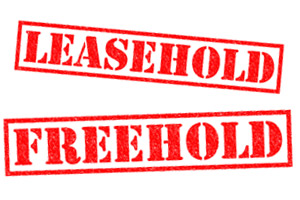View at different times of day
View the place three times at different times of the day to get an idea of what the flat and neighbourhood are like.
Daylight makes spotting flaws easier, but the pounding music that will make your life hell may not begin until the neighbours get back from work.
MoneySaver InTheRed2009 wishes they'd known this advice:
I viewed my flat just once before buying, and within an
hour of actually moving in the music started thumping through from
upstairs. This is still an ongoing problem. I viewed just once, during
the day, and it was quiet, so assumed it was fine.
- InTheRed2009
Use our checklist to spot deal-breakers
 Don't waste megabucks on a survey only to discover obvious problems. For second or third viewings, take an expert or realistic mate to give their honest opinion of the property and price.
Don't waste megabucks on a survey only to discover obvious problems. For second or third viewings, take an expert or realistic mate to give their honest opinion of the property and price.
Small issues such as a broken kitchen drawer needn't be a deal-breaker. But make a list, so you can ask the seller to fix before you get the keys.

-
Spot damp
Case the joint for wet spots, mould, peely wallpaper and condensation on windows. Check inside cupboards too. Use your nose - does it smell musty?
-
Look up at ceilings
Look for cracks, brown stains, slow drips and problem leaks.
-
Open doors and windows
Also shut every door behind you as you're being shown around to make sure they all work. Open cupboards and drawers with a smile and say: "I do hope you don't mind." Remember, you're giving them possibly £100,000s.
-
Flick switches
Turn lights on and off, especially those with older switches. Fire up the cooker. Also check the wiring's age, as updating electrics can cost large.
-
Count power points
Make a floorplan and mark out power point locations in each room, testing sockets too.
-
Inspect the plumbing
Flush toilets and turn taps on. Check cupboards underneath sinks are dry. Check water pressure and that it gets hot. If you're feeling brave, go outside, lift the drain covers, then get someone to flush the loo and check the drain's flow.
-
Feel the heat
Ask the seller to switch on the boiler and turn on the central heating. Check the radiators for leaks and rust, and make sure they all get hot right across the surface.
-
Locks are key
Ensure door locks are up to insurance standards. Most policies insist that front and back doors be fitted with a five lever mortice deadlock. Check windows for locks and the front door for break-in signs.
-
Watch out for woodchip
Buying somewhere with woodchip or other textured wallpaper slapped all over it usually means excavating through layers of paper. And probably pulling half the plaster off.
-
Lift mats and rugs
Check for stains and other nasties lurking underneath.
-
Turn on your phone
Check for a signal to confirm it's not a mobile dead zone.
-
Audit the attic
Inspecting the loft in daylight is a great way to gauge the state of the property's woodwork. Check timbers for rot, as well as cracks or holes.
-
Observe outside walls
Check for wall cracks, mould and rotten woodwork.
-
Hit the roof
Take binoculars and check for missing/slipped tiles. Eye up the gutters and woodwork for potential problems. If possible, go on a rainy day, to see if the gutters leak.
-
Avoid kitchen nightmares
In the kitchen, mime preparing a dinner. Is there enough room?
-
Take a compass
Check if estate agents' promises of a sunny south facing garden are true.
-
Pry next door
If buying a flat or terrace, alarm bells should ring if neighbours' properties are rundown. Their problems can quickly become your problems.
-
Vet the seller
If they strike you as unreliable, think twice. A property's not good value if the vendor doesn't want to sell it. You could waste thousands in fees.
Knock, knock, knocking on neighbours' doors
Neighbours may offer tip-offs on the area or home, but it's also a chance for you to get the measure of them.
Check how well maintained their home is - look for junk abandoned at the front and gardens engulfed by weeds.
Also chat to neighbours nearby, but not next to, the property. They'll be honest about what the area is like and are less likely to be either pally with the sellers or anxious to get rid of them.
Find homes where sellers DROP prices
Secret web weapons let you track when sellers put particular properties on the market, plus when and how much they cut asking prices.
One MoneySaver describes Property-Bee as "probably the most fun you'll have online". A free add-on for web browser Firefox, it show sellers on Rightmove who've altered listings. This includes price cuts, so you can see whether lack of demand means they might be willing to accept less.
Consider resale potential
If you don't want to live in the property until you die, consider ease of resale.
This may be your dream home, so you can live with walking through the kitchen to get to the bathroom. But will others?
If it's been hanging around on the market for a while, mull over why it hasn't shifted. Are people put off by the street, a takeaway shop below, lack of parking or weeny garden?
Stamp Duty Calculator - what will you have to pay?
 Buy a home and you're likely to owe stamp duty (it's called that because the document used to require a stamp to make the transaction legal). It's one of the biggest lump-sum taxes and can add £1,000s to your costs.
Buy a home and you're likely to owe stamp duty (it's called that because the document used to require a stamp to make the transaction legal). It's one of the biggest lump-sum taxes and can add £1,000s to your costs.
Look for at least 83 years on the lease
 If you own a leasehold flat, you effectively rent it for a period of time. When flats have 80 years or less left, extensions become very costly and homes much more difficult to sell. Under 60 years, it's a nightmare. If you're a flat-hunter, alarm bells should scream if a lease is nearing, or below, 80 years.
If you own a leasehold flat, you effectively rent it for a period of time. When flats have 80 years or less left, extensions become very costly and homes much more difficult to sell. Under 60 years, it's a nightmare. If you're a flat-hunter, alarm bells should scream if a lease is nearing, or below, 80 years.
Don't just accept estate agents' promises of easy extensions. You have to have owned the flat for two years before you can extend. A seller can get the ball rolling and pass the rights to the purchaser.
If a buyer waits until they've completed the purchase, it'll be another two years before they've a right to extend. It takes between three and 12 months to extend a lease, so look for properties with at least 83 years to run.
Don't rely on solicitors to point out short leases. You'd expect them to shout: "Not on your nelly - this will cost you £15,000 to extend or you won't be able to sell it." Yet after publishing our Lease Extension guide, we were shocked by stories from buyers who said solicitors didn't spell it out.
Forumite Norm says:
I bought six years ago and now my lease has 60 years
left. I cannot recall or find anything in the paperwork from the
purchase advising me that the lease would need to be extended or that
this would be expensive.
I was a first-time buyer and totally reliant on the
conveyancer's advice. I feel they should have strongly highlighted this
problem. I would not have bought this property knowing in five years I
would have to pay £10-12,000 to extend.
Beware leaseholds on new-build houses
In late 2016 it emerged that buyers of new-build properties were being caught in a leasehold trap.
Some owners of new-build leasehold houses found the freehold on their properties had been sold to an agency or investment company without their knowledge (right of first refusal only applies to leasehold flats, not houses). These organisations wanted upwards of £30,000 for the freehold on properties that cost £120,000+.
What's more, homeowners were forced to consider buying these prohibitively expensive freeholds because of spiralling ground rent that's often hidden in the small print. Such schemes have seen ground rent double every 10 years - so for example if it's set at £295 a year in 2018, it'll be £2,360 a year by 2048 and an astonishing £300,000 a year 100 years into the lease.
These practices have caught out solicitors as well as buyers, and have rendered some properties almost worthless - as word of the scandal has spread, potential buyers are understandably staying away from them.
The Government announced a raft of new measures in December 2017 to tackle the problem, including:
- A ban on leases for new-build houses except where necessary (eg, shared ownership)
- Ensuring that ground rents on new long leases are set at zero – for both houses and flats
- Working to support existing leaseholders and make it easier, cheaper and quicker to buy a freehold or extend a lease
However, it will be some time before these measures become law, and the Government has yet to announce what relief or redress it will provide for those who've already been caught out. So if you're considering a leasehold on a new-build house, tread very carefully.
Can you do a private deal?
Write a nice letter explaining you're keen to buy and post it to homes on streets you like.
Not only could you nab somewhere before others hear about it, but the seller may give a discount, as they save on estate agent fees.
This really does work. MoneySaver HypnoNu says:
We bought our current house privately. We just flyered a
load of houses with a photocopied handwritten letter and got a fair few
responses. We went to see the house we're in now, and bought directly
from the vendor without the house ever going on the market. It's
worth a shot!
HypnoNu
Monitor for-sale listings on the go
Rightmove's free iPhone and Android apps use GPS technology to pinpoint pads for sale near where you're standing. Just download the app, click ‘get my current location' and it shows a list of gaffs up for grabs.
Beware rip-off service charges
 When you own a leasehold flat, the freeholder (or landlord) is usually responsible for insuring the building and maintaining communal areas.
When you own a leasehold flat, the freeholder (or landlord) is usually responsible for insuring the building and maintaining communal areas.
Leaseholders must pay ground rent (usually small) and service charges (often a fair whack) to the freeholder. Unfair service charges are rife - papers run stories of freeholders who charge £100,000s for work costing £50,000.
Freeholders and property management companies are prone to pick costly providers. In fact, they often grab products and insurance policies that pay the most commission. While you can go to the Leasehold Valuation Tribunal to challenge unfair charges, it costs £1,000s.
So flat hunters should always get ground rent and service charges in writing before buying.
Also check the fees the freeholder charges for any consents, such as alterations, and to register or transfer mortgages. These can be significant extra costs people don't see coming.
Google the property management company to check for complaints, and ask flat-owners in the same block if they think service charges are fair. Do they have any gripes, for example, excessive service charges, substandard work or aggressive charge collecting?
Find cheaper conveyancers
Conveyancing's the legal process that transfers property from one person to another. As well as solicitors, there are licensed conveyancers, who are specialist property lawyers.
It's about searching all the official files for hidden catches and ensuring the purchase is legit. They do all the legal paperwork, Land Registry and local council searches, draft the contract and handle the exchange of cash. This is not usually something you can do yourself and usually costs £100 to £1,500.
Here are our dos and don'ts.
-
DON'T automatically use the estate agents' firm.
It's probably a commission-based recommendation. Certainly speak to them and use their price as a benchmark.
-
DO get maximum quotes in minimum time.
Answer a few questions at Reallymoving.com and it emails you at least four quotes from firms in your area. The Law Society's Find a Solicitor tool also has a section on housing and property (look for accredited firms). Ask pals for recommendations.
-
DON'T assume they need to be nearby.
Consider someone from further afield. It's perfectly possible to use a solicitor in Newcastle when you live in central London, and it can be much cheaper.
-
DO check out the web.
Some MoneySavers rate cheap'n'cheerful internet-based conveyancers that do it all via the phone and net.
Some forumites have had good experiences with the following companies: Easier2move and Online Conveyancing. However, nothing is guaranteed - feedback (as with all solicitors) varies, so please do your own research before using.
-
DON'T go for rock bottom price if you're in a rush.
The cheapest companies often work in bulk and can be slower. If time's an issue, that can be a problem. Pick a company that sounds professional and answers emails promptly.
-
DO check for hidden extras.
Ask for a full fee breakdown. Do they include bank money transfer fees, stamp duty forms, land registration fees and drainage and environmental searches? Some firms even charge extra to verify your ID. See the Legal Ombudsman's Ten questions to ask your lawyer about costs.
-
DON'T automatically use the solicitor who did your divorce.
Pick a firm that focuses on conveyancing or at least has a specialist department. Ask how many cases it handled last year. Just because someone did your divorce doesn't mean they can do this job too.
-
DO ask if they'll chuck in a will for free.
A top tip from money_maker: “Get your will done with your solicitor at the time, as some will do it for free since they are already being paid. "For more no-cost or low-cost wills, see Free & Cheap Wills.
-
DON'T be shy.
Ensure you fully understand what your legal adviser will and won't do on your behalf. See the Legal Ombudsman's tips on Using a conveyancing lawyer.
-
DO check they are regulated by a professional body.
Solicitors are regulated by the Law Society and conveyancers the Property Law Regulator. If they are, then they must have a clear complaints procedure in place.
-
DO ask if they've a holiday booked.
Will the lawyer be on holiday for any time in the next three months? If they'll be backpacking in Peru on your preferred completion date, best go with another option.
-
DO check what needs to be paid if a sale collapses.
If a sale falls through, lawyers will often charge a fee for work done even if it was the seller who pulled out. Some firms offer a "no move, no fee" service but this may not cover things like search fees which are paid out on your behalf.
Check what's being built in the area
Will that picture-postcard sea view be replaced by a high rise in a couple of months? For England and Wales, the Government's Planning Portal helps avoid nasty surprises by directing you to planning applications made in your area. You can search by postcode and area.
How much to offer?
If you're wringing your hands over how much to offer, consider asking the MoneySavers on this site's House Buying, Selling & Renting board.
They'll share their experiences and help you dig for clues.
You're likely to get more response if you post a link to the home's advertisement on one of the big property search sites such as Rightmove. Though do remember this is a public forum, and there's a chance you could give away your tactics to the seller.
Ask for them to 'take it off the market'
Make your offer on the condition that the seller “takes the home off the market". This cuts the chance of gazumping, where the seller accepts another higher offer after the sale has been agreed. Until contracts are exchanged, either party can pull out at any time.
Chase your solicitor
To put it politely, some solicitors work at their own pace. Make regular phone calls to get papers processed quicker. Remember, you're paying them. If they don't meet your expectations, try writing to a senior partner.
MoneySaving lawyer ronnie-the-red says:
Chase your solicitor. They often won't have picked up the
file as often as you think. If you chase, don't worry about bugging the
solicitor. Trust me - we need to be bugged.
Remember you are paying for their services and they are
working for you. Don't worry about annoying them, as most clients are
fairly annoying!
ronnie-the-red
Can you buy the freehold?
Considering buying a leasehold flat? Some freeholders charge £10,000s in management fees for things you could do for a fraction of that. Yet in England and Wales, owners are often entitled to buy freeholds at a fair price - reducing outgoings and potentially adding to the sale value.
Buying freehold, if you can, costs about the same as extending your lease by 90 years and you can usually then extend the lease for free, just paying legal fees. For a full how-to, read the Buy Your Freehold guide.
As inspiration, here's MoneySaver westernpromise's experience:
We bought a share of the freehold because the freeholder
was charging us £1,000/year for buildings insurance. When we bought our
own, it fell to £300/year. The freehold cost £1,500 per flat,
including legal fees. We saved £700 on insurance in the first year.
We also gained control over maintenance expenses. Before
this, the freeholder would dismiss suggestions that she was forcing us
to overpay and just hand us a huge bill.
westernpromise
Get fixtures and fittings in writing
 To avoid getting the keys to a stripped-bare house, ask the seller for a list of all fixtures and fittings included in the purchase, right down to the light fittings, the TV aerial cable screws, the black bin and the fire grate. Yes, one unlucky forumite found all these ripped out.
To avoid getting the keys to a stripped-bare house, ask the seller for a list of all fixtures and fittings included in the purchase, right down to the light fittings, the TV aerial cable screws, the black bin and the fire grate. Yes, one unlucky forumite found all these ripped out.
If you're paying extra for any fittings, remember sellers often price up goods on what they paid originally, which can have little relation to current values. For example, a £2,000 TV might have been their pride and joy when they nailed it to the wall six years ago, but would now cost £300-ish new and less second-hand.
To see if you could buy it new cheaper, use ‘shopbots' – shopping robot comparison services that scan loads of retailers for best prices. The free MegaShopBot tool auto-searches the best shopbots for each type of good.
There's a quick way to glean second-hand items' values on eBay*. Fill in the search box and tick 'completed items' on the left-hand grey bar. It'll come up with a list of prices similar items have already fetched.
Know when and if you can pull out
You can pull out from the purchase at any time before contracts are exchanged. After this, you can't change your mind without massive costs.
If the seller pulls out before you exchange contracts, you have no legal right to recover any costs from them.
One option is indemnity insurance for wasted costs - consider asking your solicitor about this.
Hammer out a deal at auction
rties can be cheaper than market values. There are properties out there for under £20,000, but auctions don't always equal bargains. Research and renovations are usually needed.
If you're considering bidding, go to a couple of auctions first to get a feel for the process. Visit properties several times. You must get a survey to reveal any horrors - there could well be hidden defects that meant the seller had to go to auction.
Always enlist a solicitor to inspect the auction pack. If you buy a property with major legal issues that need sorting, it may not be the bargain you thought it would be.
Plus do confirm the previous tenants have handed over the keys and the property is unoccupied. If the repossessed property was previously owned by a buy-to-let landlord, it's possible that the property may be resold with a tenant in situ.
Remember that the contract comes into force on the fall of the auctioneer's hammer, so you cannot pull out without huge cost after the auction.
You need finance in place before bidding
Unless you're lucky enough to be a cash buyer, you'll need to get finance in place before bidding. Call your broker and get a 'mortgage promise', which lets you know the maximum amount you can borrow.
This isn't a formal mortgage though - most lenders will not give this until you have found a specific property and they've sent a valuer round. If the mortgage company disagrees with your valuation, they may not approve the deal.
Most auctions require a 10% deposit on the day. Take a cheque book and two proofs of ID. You have between 14 days to six weeks, depending on the auctioneer, to produce the cash and complete.
Miss the deadline, and you lose the deposit. If you need to shift your current home to buy the new one, you should complete the sale before bidding.
Get the right survey
 There are two main types of survey. The first is a homebuyer's report. This normally costs £300-£400 and is suitable for conventional properties less than 50 years old.
There are two main types of survey. The first is a homebuyer's report. This normally costs £300-£400 and is suitable for conventional properties less than 50 years old.
For older or quirkier residences, consider a full structural survey. These are super-detailed, covering everything, and can cost up to £1,000, but often they're well worth the expense. It could well give you ammunition to haggle down the price.
Sadly, even those buying new builds still have to get out their wallets. Snagging surveys pinpoint defects and unfinished bits, so you can push the developer to correct them before completion.
It's also worth accompanying the surveyor. They are likely to say far more verbally than they'd write in a report.
Get quotes for work
If the survey finds any nasties, ask a reputable builder for repair costs. Ask the vendor to either fix it before completion or knock the total off the price.
Do get a second opinion, especially with damp. What might seem like minor work can be complex and expensive, as forumite Canny-cat's story shows:
Our survey told us the house had a minor case of damp
that would cost £400 to solve. It seemed so minor that we didn't even
bother to renegotiate with the seller. Once we'd moved in, we
discovered the full extent of the damp problem and paid over £4,000,
plus associated redecoration costs, on tanking the entire ground
floor.
The sellers had the walls skimmed shortly before putting
on sale, so that you couldn't notice the damp for a few months. Then
the metal wall fixings and sockets started rusting, the plaster
started to salt and bubble, and I developed asthma.
Canny-cat
Don't get floody caught out
Flood risk has a significant impact on insurance premiums and a property's value. Go to Gov.uk (England and Wales) and Environment Protection Agency (Scotland) to request reports on whether and why an area's at risk.
This can reveal how vulnerable a property is, possibly saving years of stress. Don't learn it the hard way, like forumite spannerzone:
Having been flooded, I'd never buy in a risk zone again.
My concerns would be getting insurance as well as the potential
life-changing mess that a bad flood can cause.
It seemed highly unlikely flooding would ever happen to
me, so I never gave it any real thought. The day it flooded and every
single item I owned got ruined was somewhat of an eye opener, I must
say.
spannerzone
Check 'n' challenge your council tax band
Up to 400,000 homes in England and Scotland may have been in the wrong band since the early 1990s. If so, you can get your band lowered and a backdated payout.
Top 10 last-ditch questions to ask sellers
Your life will be easier if you remember to ask the previous owner all the essential questions before they give you the keys. To help, we've compiled a list of top questions to ask:
- Where's the main stopcock (to shut off the water)?
- Where are the gas and electricity meters?
- Do any surfaces need special cleaning products, for example wooden floors?
- What day do the dustmen come?
- Do you have any old tins of paint in the same colour as the walls?
- Do you have any instruction manuals or warranties on electrical items?
- Where did the kitchen and bathroom tiles come from?
- Where did any fixed furniture come from, eg, kitchen cabinets?
- Who supplies the energy, broadband and home phone?
- Where is the thermostat?
Instantly compare removal costs
Moving from the family home for the first time needs a car and a couple of mates but most people will need to use a removal firm. Get five local quotes instantly at Reallymoving.com. Check the company belongs to the British Association of Removers.
Grab home insurance quotes before buying
 Always get home insurance quotes before you exchange contracts to ensure suitable cover's available. This could flag up issues, for example if the property's in a flood-risk area.
Always get home insurance quotes before you exchange contracts to ensure suitable cover's available. This could flag up issues, for example if the property's in a flood-risk area.
Don't think you must use your mortgage provider's cover. If you pay for buildings and/or contents insurance alongside your mortgage, it's often awful value.
No one home insurer's cheapest, so the key's bagging as many quotes as possible. To find the cheapest, combine the top comparisons listed in our Cheap Home Insurance guide.
Dirt bust
The house could be manky when you arrive, so if possible, tackle the grime before moving day. MoneySaver mrs_montgomery says:
When you move in, the place will be FILTHY. If you buy it new it will be full of chips of plaster and dust.
If you buy it from someone else, the cupboards will be grubby
and the walls covered in big dirty moving-men fingermarks and scrapes
from where they've carried their furniture down the stairs.
mrs_montgomery
Protect your family from gas leaks
 Forty people die each year and hundreds more are admitted to A&E due to carbon monoxide, a poisonous gas that has no colour, taste or smell..
Forty people die each year and hundreds more are admitted to A&E due to carbon monoxide, a poisonous gas that has no colour, taste or smell..
Before you move in, make sure you get a copy of the annual Gas Safety Certificate, which shows that all gas appliances have had a service by an engineer listed on the Gas Safe Register.
Forumite November's experience is a case in point:
Just after we moved in I had to call Transco in the
middle of the night. We thought we had flu. We had carbon monoxide
poisoning and were alive due to a faulty cat flap venting out most of
the gas.
The system was condemned. It was a very lucky escape - it never occurred to me to check the gas certificate.
Save £100s on gas and electricity
As soon as you move into your new place you'll need to start paying for energy. It can be cheaper to switch rather than sticking with the previous owners' energy s
You can still compare, even if you don't have previous bills from your new house. Just tell our Cheap Energy Club some info about the new house and whether you're a high, medium or low user. It'll show the cheapest tariff for you and give up to £30 cashback.
This won't be 100% accurate as it makes some assumptions, but it will give you good options, likely to be far cheaper than the default standard tariff you'll be put on when you moved in.
Finally, don't forget to take meter readings when you move in.
Free sofas, beds, TVs, fridges and more
 Furnishing your new pad? Hundreds of top-quality goodies are available daily for free. It's all about web communities, and the big names are Freecycle and Freegle.
Furnishing your new pad? Hundreds of top-quality goodies are available daily for free. It's all about web communities, and the big names are Freecycle and Freegle.
What's the catch? There isn't one. Instead of dumping goods or eBaying them, people harness the web's power to offer them to their local communities. So as well as getting kitted out for nowt, the environment benefits as unwanted items aren't flung into landfills.
Of course, there is some moth-bitten tat out there. But there's also top-quality stuff people just don't use anymore. Bagging the best is all about the etiquette - you need to give yourself and keep your eyes peeled.
Don't buy your lenders' mortgage life assurance
If you die, mortgage life assurance ensures your dependants needn’t worry about repaying the mortgage. Policies are designed to pay off the remaining debt on repayment mortgages if you die within a set number of years.
Don't fall for your mortgage lender's “and you’ll need our life insurance” pitch. It’s likely you’ll pay massively over the odds.
Give yourself a money overhaul
Moving is the perfect time to grab your finances by the nipples and tweak ‘em hard. You'll be signing up to new services anyway, so could save £1,000s on your previous bills by ensuring you grab everything cheapest.
then try Digital TV Cost Haggling and Water Bills. Those are just the start. For a detailed checklist of over 30 quick ways to cut bills, see the Money Makeover guide.
Bag £700 free insulation
If the home you're moving into isn’t properly insulated, you may be able to get free loft and cavity wall insulation.
The total cost of both, including building work, can be worth £700, according to the Energy Saving Trust.
Rent your spare room
 If you've a spare room, you could rent it out to a lodger and take home £7,500 a year without paying a penny in tax. If you've a desirable property and don't mind paying income tax, you could easily earn more.
If you've a spare room, you could rent it out to a lodger and take home £7,500 a year without paying a penny in tax. If you've a desirable property and don't mind paying income tax, you could easily earn more.
If you're renting a room out, then you have two options to legitimately reduce tax - but you must choose one:
-
The Rent A Room scheme:
The Rent A Room scheme means you can take in a lodger to live in a furnished room in your home. It has a special exemption meaning you won't have to pay tax on the first £7,500 you make each year.
This is a huge tax break for most people and really ups the gain. Better still, as a landlord you'll be expected to ask for a month in advance, which means ready cash comes in quickly.
-
Deducting expenses:
Alternatively, HMRC allows landlords to deduct mortgage interest costs and certain other expenses from any rental income. This can be a bigger saving in some cases. See Gov.uk for full info.
If you don't want to do it full-time, you can play guesthouse. Airbnb and Wimdu let you to list your spare room online, and take in travellers looking for a cheap place to stay. You can set the nightly cost, undercutting the local hotels, and you might just get to work on your language skills too.
Save £100s on boiler cover costs
There’s nothing worse than arriving home when it’s freezing to discover the central heating’s packed up and there’s no hot water. Everything else flies out the window while you frantically search for someone who'll fix it.
Instead of waiting until it gives up the ghost and paying over the odds for emergency repair costs, make getting your boiler cover sorted part of the moving-in process.
 It's not as easy as get a mortgage, grab the keys and, bish bash bosh, you're in. Buying a home's almost guaranteed to cost more than you think. Here's what to factor in.
It's not as easy as get a mortgage, grab the keys and, bish bash bosh, you're in. Buying a home's almost guaranteed to cost more than you think. Here's what to factor in. Don't apply for mortgages before checking your credit files at the main agencies are error-free.
Don't apply for mortgages before checking your credit files at the main agencies are error-free. Don't waste megabucks on a survey only to discover obvious problems. For second or third viewings, take an expert or realistic mate to give their honest opinion of the property and price.
Don't waste megabucks on a survey only to discover obvious problems. For second or third viewings, take an expert or realistic mate to give their honest opinion of the property and price. Buy a home and you're likely to owe stamp duty (it's called that because the document used to require a stamp to make the transaction legal). It's one of the biggest lump-sum taxes and can add £1,000s to your costs.
Buy a home and you're likely to owe stamp duty (it's called that because the document used to require a stamp to make the transaction legal). It's one of the biggest lump-sum taxes and can add £1,000s to your costs.
 If you own a leasehold flat, you effectively rent it for a period of time. When flats have 80 years or less left, extensions become very costly and homes much more difficult to sell. Under 60 years, it's a nightmare. If you're a flat-hunter, alarm bells should scream if a lease is nearing, or below, 80 years.
If you own a leasehold flat, you effectively rent it for a period of time. When flats have 80 years or less left, extensions become very costly and homes much more difficult to sell. Under 60 years, it's a nightmare. If you're a flat-hunter, alarm bells should scream if a lease is nearing, or below, 80 years. When you own a leasehold flat, the freeholder (or landlord) is usually responsible for insuring the building and maintaining communal areas.
When you own a leasehold flat, the freeholder (or landlord) is usually responsible for insuring the building and maintaining communal areas. To avoid getting the keys to a stripped-bare house, ask the seller for a list of all fixtures and fittings included in the purchase, right down to the light fittings, the TV aerial cable screws, the black bin and the fire grate. Yes, one unlucky forumite found all these ripped out.
To avoid getting the keys to a stripped-bare house, ask the seller for a list of all fixtures and fittings included in the purchase, right down to the light fittings, the TV aerial cable screws, the black bin and the fire grate. Yes, one unlucky forumite found all these ripped out. There are two main types of survey. The first is a homebuyer's report. This normally costs £300-£400 and is suitable for conventional properties less than 50 years old.
There are two main types of survey. The first is a homebuyer's report. This normally costs £300-£400 and is suitable for conventional properties less than 50 years old. Always get home insurance quotes before you exchange contracts to ensure suitable cover's available. This could flag up issues, for example if the property's in a flood-risk area.
Always get home insurance quotes before you exchange contracts to ensure suitable cover's available. This could flag up issues, for example if the property's in a flood-risk area. Forty people die each year and hundreds more are admitted to A&E due to carbon monoxide, a poisonous gas that has no colour, taste or smell..
Forty people die each year and hundreds more are admitted to A&E due to carbon monoxide, a poisonous gas that has no colour, taste or smell.. Furnishing your new pad? Hundreds of top-quality goodies are available daily for free. It's all about web communities, and the big names are Freecycle and Freegle.
Furnishing your new pad? Hundreds of top-quality goodies are available daily for free. It's all about web communities, and the big names are Freecycle and Freegle. If you've a spare room, you could rent it out to a lodger and take home £7,500 a year without paying a penny in tax. If you've a desirable property and don't mind paying income tax, you could easily earn more.
If you've a spare room, you could rent it out to a lodger and take home £7,500 a year without paying a penny in tax. If you've a desirable property and don't mind paying income tax, you could easily earn more.

 Unless you can pile your belongings into the back of a car, factor in a removal van. These start at £100 for small local moves, but can easily run to £1,000 for shifting a family's worldly goods long distances.
Unless you can pile your belongings into the back of a car, factor in a removal van. These start at £100 for small local moves, but can easily run to £1,000 for shifting a family's worldly goods long distances.


















No comments:
Post a Comment
Thanks for visiting the blog. Your comments are welcome.